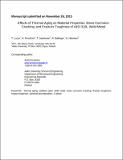| dc.contributor.author | Lucas, Timothy Ryan | |
| dc.contributor.author | Forsström, Antti | |
| dc.contributor.author | Saukkonen, Tapio | |
| dc.contributor.author | Ballinger, Ronald G. | |
| dc.contributor.author | Hänninen, Hannu | |
| dc.date.accessioned | 2016-08-05T17:03:28Z | |
| dc.date.available | 2017-04-11T21:29:34Z | |
| dc.date.issued | 2016-06 | |
| dc.identifier.issn | 1073-5623 | |
| dc.identifier.issn | 1543-1940 | |
| dc.identifier.uri | http://hdl.handle.net/1721.1/103861 | |
| dc.description.abstract | Thermal aging and consequent embrittlement of materials are ongoing issues in cast stainless steels, as well as duplex, and high-Cr ferritic stainless steels. Spinodal decomposition is largely responsible for the well-known “748 K (475 °C) embrittlement” that results in drastic reductions in ductility and toughness in these materials. This process is also operative in welds of either cast or wrought stainless steels where δ-ferrite is present. While the embrittlement can occur after several hundred hours of aging at 748 K (475 °C), the process is also operative at lower temperatures, at the 561 K (288 °C) operating temperature of a boiling water reactor (BWR), for example, where ductility reductions have been observed after several tens of thousands of hours of exposure. An experimental program was carried out in order to understand how spinodal decomposition may affect changes in material properties in Type 316L BWR piping weld metals. The study included material characterization, nanoindentation hardness, double-loop electrochemical potentiokinetic reactivation (DL-EPR), Charpy-V, tensile, SCC crack growth, and in situ fracture toughness testing as a function of δ-ferrite content, aging time, and temperature. SCC crack growth rates of Type 316L stainless steel weld metal under simulated BWR conditions showed an approximate 2 times increase in crack growth rate over that of the unaged as-welded material. In situ fracture toughness measurements indicate that environmental exposure can result in a reduction of toughness by up to 40 pct over the corresponding at-temperature air-tested values. Material characterization results suggest that spinodal decomposition is responsible for the degradation of material properties measured in air, and that degradation of the in situ properties may be a result of hydrogen absorbed during exposure to the high-temperature water environment. | en_US |
| dc.description.sponsorship | Finnish Research Programme on Nuclear Power Plant Safety 2011-2014 (ENVIS project) | en_US |
| dc.description.sponsorship | Tokyo Electric Power Company | en_US |
| dc.publisher | Springer US | en_US |
| dc.relation.isversionof | http://dx.doi.org/10.1007/s11661-016-3584-6 | en_US |
| dc.rights | Creative Commons Attribution-Noncommercial-Share Alike | en_US |
| dc.rights.uri | http://creativecommons.org/licenses/by-nc-sa/4.0/ | en_US |
| dc.source | Springer US | en_US |
| dc.title | Effects of Thermal Aging on Material Properties, Stress Corrosion Cracking, and Fracture Toughness of AISI 316L Weld Metal | en_US |
| dc.type | Article | en_US |
| dc.identifier.citation | Lucas, Timothy, Antti Forsström, Tapio Saukkonen, Ronald Ballinger, and Hannu Hänninen. “Effects of Thermal Aging on Material Properties, Stress Corrosion Cracking, and Fracture Toughness of AISI 316L Weld Metal.” Metallurgical and Materials Transactions A 47, no. 8 (June 14, 2016): 3956–3970. | en_US |
| dc.contributor.department | Massachusetts Institute of Technology. Department of Nuclear Science and Engineering | en_US |
| dc.contributor.mitauthor | Lucas, Timothy Ryan | en_US |
| dc.contributor.mitauthor | Ballinger, Ronald G. | en_US |
| dc.relation.journal | Metallurgical and Materials Transactions A | en_US |
| dc.eprint.version | Author's final manuscript | en_US |
| dc.type.uri | http://purl.org/eprint/type/JournalArticle | en_US |
| eprint.status | http://purl.org/eprint/status/PeerReviewed | en_US |
| dc.date.updated | 2016-07-07T03:56:27Z | |
| dc.language.rfc3066 | en | |
| dc.rights.holder | The Minerals, Metals & Materials Society and ASM International | |
| dspace.orderedauthors | Lucas, Timothy; Forsström, Antti; Saukkonen, Tapio; Ballinger, Ronald; Hänninen, Hannu | en_US |
| dspace.embargo.terms | N | en |
| dc.identifier.orcid | https://orcid.org/0000-0002-5818-9825 | |
| dc.identifier.orcid | https://orcid.org/0000-0001-9580-2812 | |
| mit.license | OPEN_ACCESS_POLICY | en_US |
